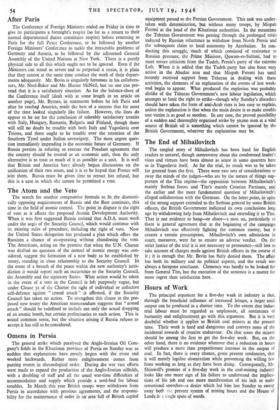After Paris
The Conference of Foreign Ministers.ended on Friday in time to give its participants a fortnight's respite (so far as a return to their normal departmental duties constitutes respite) before returning to Paris for the full Peace Conference, to be followed by another Foreign Ministers' Conference to tackle the intractable problems of Germany and Austria, to be followed by the adjourned General Assembly of the United Nations at New York. There is a purely physical side to all this which ought not to be ignored. Even if the Ministers can stand so severe and so perpetual a strain, it is plain that they cannot at the same time conduct the work of their depart- ments adequately. Mr. Bevin is singularly fortunate in his collabora- tors, Mr. Noel-Baker and Mr. Hector McNeil, but no one can pre- tend that it is a satisfactory situation. As for the balance-sheet of the Conference itself (dealt with at some length in an article on another page), Mr. Byrnes, in statements before he left Paris and after he reaches! America, made the best of a success that for most of the time looked singularly like failure. However, the lines do appear to be set for the conclusion of tolerably satisfactory treaties with Italy, Hungary, Rumania, Bulgaria and Finland, though there will still no doubt be trouble with both Italy and Yugoslavia over Trieste, and there ought to be trouble over the retention of the Southern Tyrol under Italian sovereignty. The most urgent ques- tion immediately impending is the economic future of Germany. If Russia persists in refusing to execute the Potsdam agreement that the country should be treated as an economic unit, then the only alternative is to treat as much of it as possible as a unit. It is well that Britain and America have already begun discussions on the unification of their two zones, and it is to be hoped that France will join them. Russia must be given time to retract her refusal, but this is a case in which she cannot be permitted a veto.


























 Previous page
Previous page